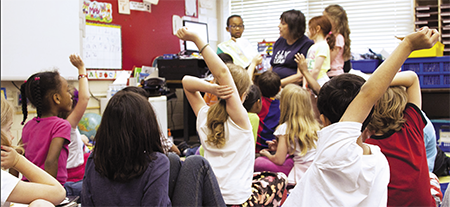By Sean Delaney
Parents will be thrilled when kids can return to school without a mask, or a small bottle of hand sanitizer. When they can return to school without the COVID-19 pandemic.
But what will that return be like if the only memories you’ve had are the COVID-19 pandemic?
It’s a consistent refrain from many concerned parents, that their toddlers, about to enter a new stage of life, only know life one way. With a mask. With restrictions. With social distancing. As resilient children are known to do, the majority of toddlers have seamlessly adapted to the new normal society lives in. Many parents of young ones are still wondering, what will the transition back be like for little ones? Is there anything that should be done to prepare them?
Nikki Martyn, Program Head of Early Childhood Studies at the University of Guelph-Humber said thinking about what post-pandemic life might look and feel like is interesting because no one knows what the world is going to be like.
 “What I find fascinating is that since our experiences of relationships and the world have been disrupted for two years, there are toddlers who have never experienced “normal” pre-pandemic life, so this idea of going back to something doesn’t exist for them, so in essence it doesn’t really exist for any of us,” she said. “In some ways we are in a position to decide what we want from life. Everyone’s experience has been slightly different.”
“What I find fascinating is that since our experiences of relationships and the world have been disrupted for two years, there are toddlers who have never experienced “normal” pre-pandemic life, so this idea of going back to something doesn’t exist for them, so in essence it doesn’t really exist for any of us,” she said. “In some ways we are in a position to decide what we want from life. Everyone’s experience has been slightly different.”
Tanya Kaefer assistant professor in the Faculty of Education at Lakehead University, specializing in education studies said there is good news and bad news when thinking about kindergarten. School is a variety of experiences with children coming from numerous backgrounds and numerous different family and life situations into a social group that toddlers haven’t experienced previously. Because this is such a huge transition anyway, and difference from what their home life would have brought them before, the changes out of the pandemic may not seem too great.
However, Kaefer said. Nobody needs more stress.
“Two years of a pandemic is stressful. It’s stressful for parents, teachers and kids alike,” she said. “Kids may be feeling anxious, traumatized, and unsure of how to be safe. Kids at every age are feeling that stress and pressure and adding on an already stressful transition - like the one to Kindergarten - is likely to exacerbate that stress. Overall, schools are going to have to be prepared to deal with that stress - and that’s going to mean mental health initiatives and preparation.”
Her real advice is to be patient. She said in a tough transition, kids may experience a variety of emotions.
“It’s also worth pointing out that in young kids’ emotional struggles can show up in different ways. It may look like anxiety, or misbehavior, or a regression to more “babyish” behaviours. If they’re seeing behaviour that’s concerning, they should contact their family doctor or a counselor,” Kaefer said. “Is this going to be a mental hurdle for kids to get over, or do you believe they will transition quickly? I think it may be both. Different kids will have different reactions, of course, but I think this kind of transition is both a hurdle and something that they become accustomed to.”
Dr. Elena Merenda, Assistant Program Head of Early Childhood Studies at the University of Guelph-Humber said she believes it is important that parents emphasize that the way we are living now is not “normal” life.
“Normally we do not wear masks, we do not distance ourselves from one another, and we do not lockdown and isolate. It’s important that children understand this is a moment in time; although a very long moment, but it is only a moment. And doctors/the government have put these measures in place to keep us safe. Very soon, we will not need to wear masks or distance ourselves from one another and that is what we call “normal”. That is what we want them to expect post-pandemic.”
To prepare them for a post-pandemic world that will be familiar to us but so unfamiliar to the children, she said it is important that children understand the reality of COVID.
“Children need to understand that there is safety in the world. It is okay to go out without a mask and breathe fresh air. It is okay to hug and touch their friends and families. It is okay to play at the playground and dig in the dirt. It is okay to just be kids.”

















